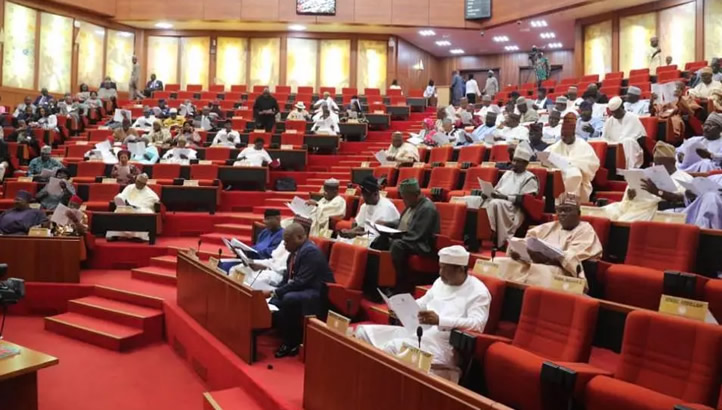Senator Sani Musa, the chairman of the Joint Senate Committee on the 2024–2026 Medium Term Expenditure Framework and Fiscal Strategy Paper, declared that going forward, no government agency will be permitted to spend the money they raise.
Musa has consequently instructed all revenue-generating organizations in the nation to provide his panel with information regarding the remittances they have made thus far this year. Musa is also the Chairman of the Senate Committee on Finance.
The Accountant-General of the Federation’s office was additionally instructed by him to compile information on remittances and a list of those who were in default.
Musa issued the order during the current public hearing on MTEF, which is being conducted by a bipartisan Senate committee that he chairs.
In order to discuss the 2024–2026 Medium Term Expenditure Framework and Fiscal Strategy, chiefs of federal ministries, departments, and agencies are being consulted by a panel consisting of the Committees on Appropriations, National Planning and Economic Affairs, and Local and Foreign Debts.
Musa declared, “The National Assembly is putting a lot of effort into safeguarding the nation’s economy.
As an example, the Nigerian National Petroleum Company Limited is a Nigerian entity and is subject to Nigerian laws and basic standards. It is required to remit when the time comes.
“An agency of the government shall not approach us and claim an exemption from paying taxes to the consolidated revenue funds.”
“The Accountant General should take note of the agencies that have not yet remitted their revenues to the CRF,” Musa continued.
“In order for us to find time to meet again like this and resolve those issues, you should get in touch with the Committee’s secretariat.”
When the Nigerian Institute of Legal and Advanced Studies and the Nigerian Maritime Academy presented on delayed remittances to the CRA, Musa was reacting.
He asked that the committee receive a detailed report from the MDAs detailing their revenue collection and remittances as of January 1.
He stated that MDAs knew that any conduct that violated financial regulations was illegal.
According to him, agencies ought to make every effort to promptly send the government the money they have collected.
He also asked for the committee to have access to all remittance receipts.
Based on presentations from the Office of Accountant General for the Federation and the Nigerian Communication Commission, Musa brought up concerns about differences in revenue forecasts and remittances.
In order to reconcile the remittances made and the revenue forecasts in the 2026–2027 MTEF and FSP, he further asked the Accountant General of the Federation to communicate with MDAs.
He also asked for a thorough analysis of the remittances made up of the money the MDAs received from stamp duties.
According to Musa, the Fiscal Responsibility Act and the country’s financial regulations must be followed in the correct reconciliation of the remittances.
The MDAs are contacted by the Accountant-General of the Federation, Mrs. Oluwatoyin Madein, to balance their accounts and remittances to the government in compliance with the financial rules.
Additionally, in response to a query regarding a fresh government loan request, Mrs. Patience Oniha, the Director-General of the Debt Management Office, stated that Nigeria must push itself in terms of revenue generation given its projected obligations for debt servicing.
The Office of Accountant General of the Federation, Nigeria Maritime Academy, and Nigerian Institute of Advanced Legal Studies were among the MDAs which submitted their income predictions for the 2024–2026 MTEF and FSP.
The Development Bank of Nigeria, the National Oil Spill Detection and Response Agency, the Debt Management Office, and others are among the others.
Both the Federal Mortgage Bank and the Nigerian Communication Commission Joint Matriculation and Examination Board were ordered to reappear and provide their projected income and expenses on a different day.
The Ministry was projecting an IGR of N3.1 trillion, according to the Accountant General earlier.
Speaking about the ministry’s revenue in three years, she stated, “In 2020, the federation account showed N7.9 trillion in budgeted revenue; however, real gross revenue was N8 trillion, and net distribution was N7.6 trillion.
He went on, “The budget for 2021 was N9.2 trillion, while the actual gross inflow was N9.3 trillion, and the net inflow was N7.7 trillion.
2022 saw a N15 trillion budget, N12.2 trillion in actual income, and N8.6 trillion in net distribution.
The overall revenue inflow as of October 2023 was N12.4 trillion, compared to the revenue target of N13,7 trillion.
The actual amount under Stamp Duty for 2020 was N119 billion, compared to the budget of N17.3 billion.
The Accountant General said, “In 2021, N33.94 billion was generated compared to N16.8 billion that was budgeted.
“Stamp duties in the budget for 2022 were N16.8 billion, but N53.5 billion was earned.
The amount allocated was N44.46 billion in 2023, whereas the amount generated was N53 billion.
“In 2020, the IGR was N871.3 billion, but the real amount was N532.9 billion.”
She said, “In 2021, N1.06 trillion was generated, compared to the N1.06 trillion budgeted amount.” In 2022, N1.39 trillion was collected as opposed to the N2.2 trillion that was budgeted.
As of September 2023, the actual amount was N1.42tn, but the budget for 2023 was N2.6tn.
“We are limited to projecting IGR for 2024, and we have done so by adding 20% to the 2023 budget, or N3.1 trillion,” the speaker continued.

